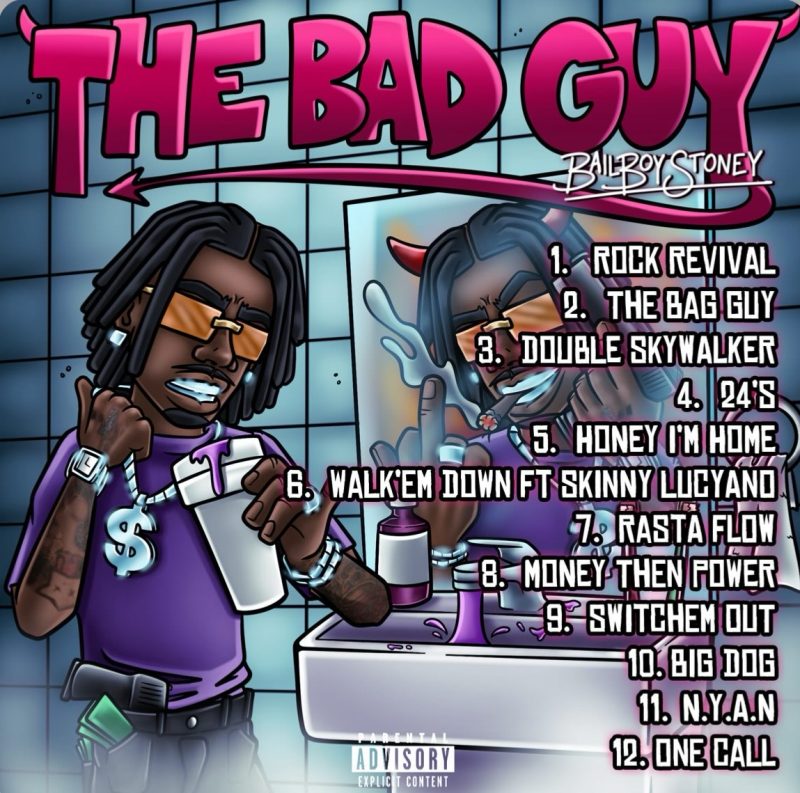In the world of hip-hop, many artists draw their strength from the streets, finding a unique voice and message that resonates with fans. BAILBOY Stoney’s latest album captures the grit, honesty, and energy of that journey. For Stoney, this project represents more than music; it’s the beginning of a new era and an evolution of his artistry. With influences like EST Gee, a dedication to R&B, and a powerful mindset, Stoney’s work speaks to the complexities of self-perception and the dynamics of being labeled a “bad guy” in others’ eyes.
“Sometimes you’re the bad guy in people’s story, and that’s 100% fine,” says Stoney. “As long as you’re not the loser!” This understanding drives his album’s narrative. It’s about rising above what people think and focusing on a larger vision for himself and his music.
Creating the “Grim Reaper” Sound
The process behind this album was a lesson in collaboration, sound creation, and refining a unique vibe Stoney calls the “Grim Reaper” or “BAILBOY Party” sound. This wasn’t an overnight development; it was a calculated journey that took around three months from start to finish. Every studio session was memorable, as Stoney built relationships with producers, creating a sonic identity that feels both raw and hauntingly intense.
“My producers—Deemac, Six7, X, 24, Beata, and Moi—are a crucial part of this album,” he says. “I developed personal relationships with each one of them, and they’re as important to this album as I am. Shoutout to Skinny Luciano too, who delivered a perfect verse on the only featured track on the album.” For Stoney, it’s not just about making music; it’s about making connections and cultivating loyalty.
Drawing Inspiration from EST Gee’s “Bad Guy”
A significant inspiration behind the album’s theme is the song “Bad Guy” by EST Gee. The concept of embracing a misunderstood image resonated with Stoney, especially during a period when he felt happier but was seen as the “bad guy” in others’ stories. He recalls how listening to “Bad Guy” reflected his own journey, where he had to confront his identity and the fact that not everyone would understand his happiness and decisions.
Interestingly, throughout the album’s creation, Stoney primarily listened to R&B music—a genre known for its emotive and introspective qualities. This genre balance added depth to his production and lyrical choices, merging the grit of hip-hop with the soul of R&B.
Tracks that Define the Album
The album opens with “Rock Revival,” a track intentionally different from the rest. “It’s the rawest version of me in my most natural element,” he explains. This track serves as a powerful introduction, setting a tone of authenticity and intensity while showcasing the versatile energy that will define his future work.
For Stoney, the lyrics are also deeply personal. One verse in particular stands out to him: “Nigga don’t show yo hand, when shit don’t go as planned then they start switching, when shit don’t go as planned these niggas turnt to bitches, I’m a witness.” This line encapsulates the challenges he faced while making the album—discovering who truly supports him and who doesn’t. He reflects that “the process of making this album showed me how much genuine love I have around me and how many people believe I can win.” This insight speaks to the core of B.A.I.L (Based All in Loyalty), a theme that permeates his music.
Another standout track, “Rasta Flow,” carries special significance, thanks to the unwavering support of his close friend 10K Cash. “If that song blows, 10K Cash is the reason. He believed in it more than some of his own songs. Shoutout to lil bro,” Stoney shares, highlighting the role of friendship and mutual support in his music career.
A Bold Vision for the Future
Looking ahead, Stoney sees this album as more than a project—it’s an introduction, the first leg of a race that he intends to run with unwavering energy. “This is the first real chapter in my music career. It’s the front page of the book,” he says. Stoney’s goal is straightforward yet ambitious: he wants at least one song from the album to resonate deeply with every fan, creating timeless connections and sparking a global movement.
Stoney is also open to taking his sound on the road, eager to perform anywhere that’s ready to embrace his music. “We’re about to turn up anywhere that wants us when we drop! Book me, let’s turn up,” he says with confidence, signaling his readiness for live performances and connecting with fans face-to-face.
Embracing the Role of “Bad Guy” with Confidence
Throughout his career, Stoney has grappled with the perception of being the “bad guy.” He’s realized that, while some may see him in a negative light, he knows his truth and embraces it. “Be the bad guy,” he says with conviction. “You live once; live your best life. I’ve realized I’m only the bad guy in people’s stories that have delusional narratives behind them. ONE TIME FOR THE BAD GUY!”
This album also reflects Stoney’s personal growth. The carelessness he once carried has transformed into love, both for himself and his art. This evolution is embodied in tracks like “Honey I’m Home,” a song that surprised even Stoney with its energy and the confidence it brought out of him.
As he closes out this album and gears up for what’s next, Stoney’s message is clear: “There’s no way to stop this train; it’s easier to hop on.” With his unwavering focus on loyalty, authenticity, and the art of being unapologetically himself, BAILBOY Stoney is poised to leave a lasting mark on the industry. Through his music, he invites listeners to turn up, connect, and embrace life—even if it means being the “bad guy” in someone else’s story.

